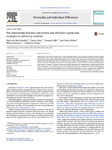The relationship between self-esteem and self-worth protection strategies in university students

Non accesible ata 9999-99-99
Use este enlace para citar
http://hdl.handle.net/2183/35006Coleccións
- Investigación (FEDU) [938]
Metadatos
Mostrar o rexistro completo do ítemTítulo
The relationship between self-esteem and self-worth protection strategies in university studentsAutor(es)
Data
2016-01Cita bibliográfica
Ferradás, M. M., Freire, C., Valle, A., Núñez, J. C., Regueiro, B., & Vallejo, G. (2016). The relationship between self-esteem and self-worth protection strategies in university students. Personality and Individual Differences, 88, 236-241. DOI: 10.1016/j.paid.2015.09.029
Referenciado por
Jenzer, T., Read, J. P., Naragon‐Gainey, K., & Prince, M. A. (2019). Coping trajectories in emerging adulthood: The influence of temperament and gender. Journal of Personality, 87(3), 607-619. doi: 10.1111/jopy.12419
Resumo
[Abstract] Self-esteem is one of the variables that are most frequently linked to the adoption of self-protection strategies. However, the nature of this relationship continues to be controversial. The present study examines the relationship between self-esteem and the use of behavioral and claimed self-handicapping, as well as of defensive pessimism, and their relationship with gender in university students. A total of 1031 university students took part in the study. For women, polynomial regression analysis demonstrated a negative linear relationship of claimed self-handicapping and a tendency toward a quadratic relationship in the case of behavioral self-handicapping, as well as a mainly quadratic relationship in the use of defensive pessimism. For men, a negative linear relationship was found in all cases. The theoretical and psychoeducational implications of these findings are discussed.
Palabras chave
Self-esteem
Self-handicapping
Defensive pessimism
Gender
University students
Linear and quadratic relationship
Self-handicapping
Defensive pessimism
Gender
University students
Linear and quadratic relationship
Versión do editor
Dereitos
©2015ElsevierLtd.All rights reserved.
ISSN
0191-8869





